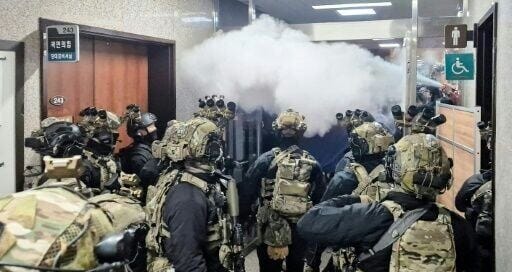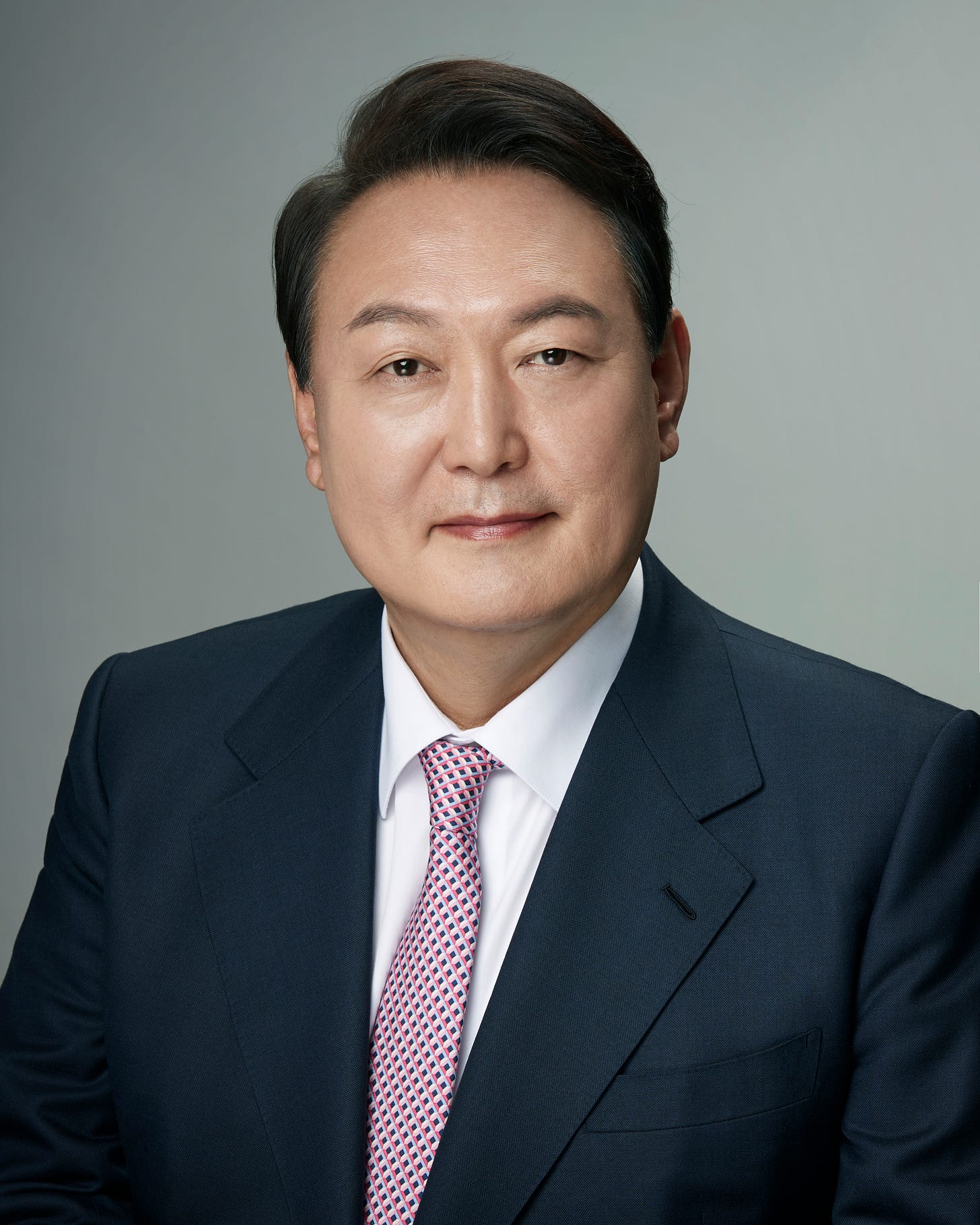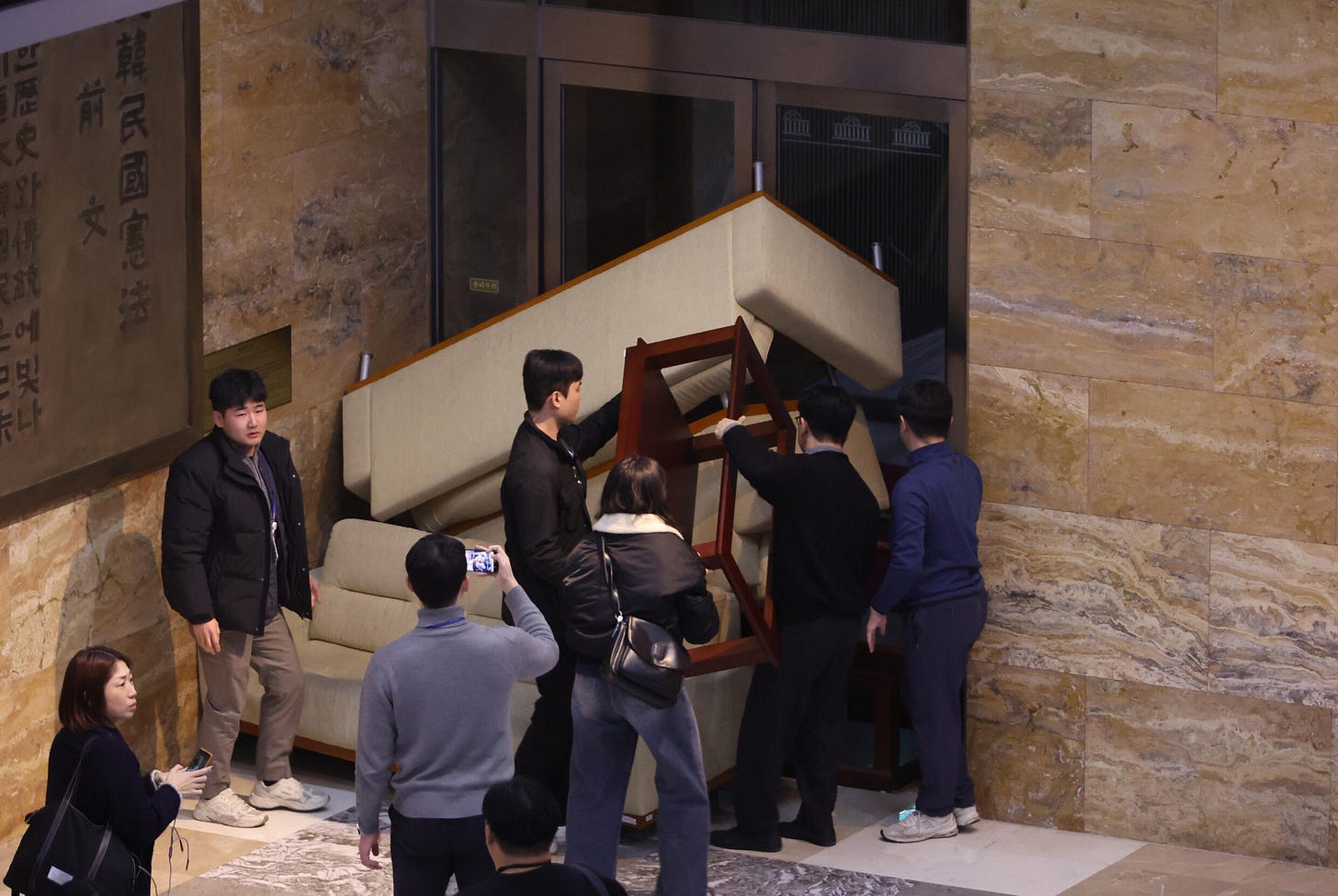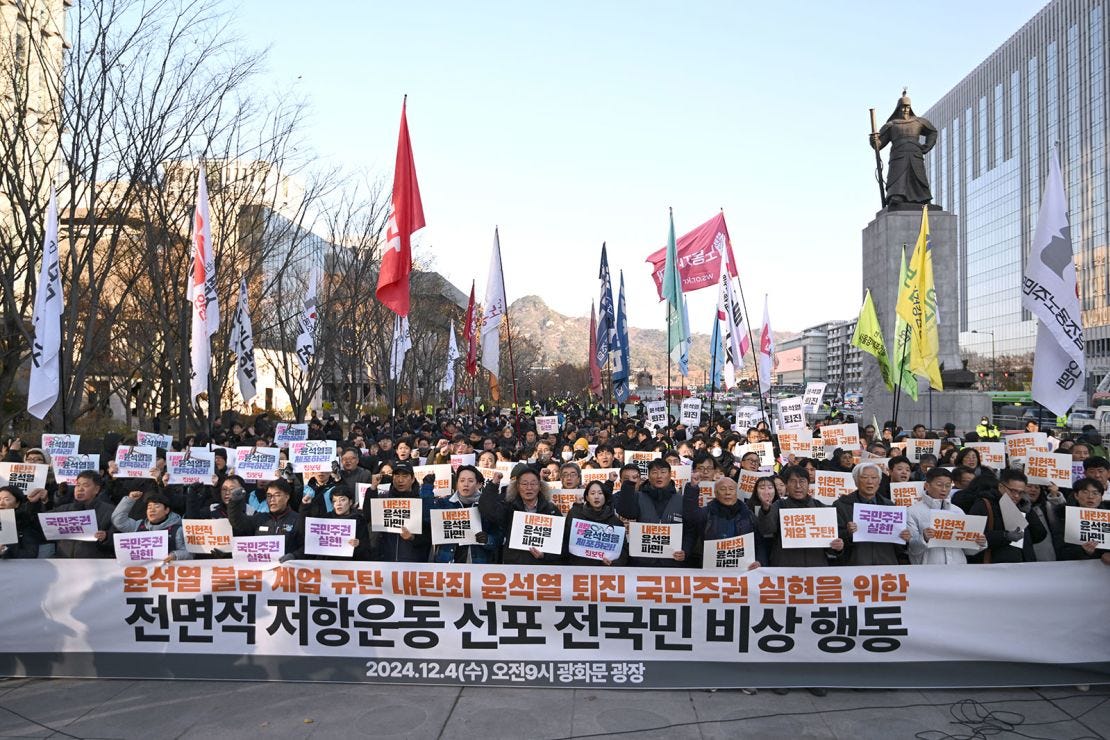Korean Martial Law: It Could Happen Here
It seems that political instability is not restricted to the West, and the recent shenanigans in South Korea should be a wakeup call to those politically informed
Recently, president Yoon instituted martial law in South Korea. The western media is reporting that his approval numbers had slipped below 20% and that he declared martial law as an attempt to hang onto power. He claimed that the government has become occupied by opposition communist sympathizers.
After the late-night declaration of martial law, there was an attempt to assemble the South Korean parliament to overrule the president. The South Korean military was activated to prevent lawmakers from arriving at the parliamentary building for a vote. Lawmakers barricaded themselves within the building to cast a deciding vote, which would (legally) force the president to rescind martial law. The vote was 190 to 0. This event makes an excellent case study surrounding the way that legal authority is used in democratic nations. It also exemplifies the fact that the global democratic system is beginning to crack under the pressures of social, demographic and economic strains.
From a technical perspective, the most interesting aspect of this entire debacle is that an assembly by the parliament to rescind martial law was sufficient to actually do it. It was by a vote that they forced the military to back down. President Yoon has not been heard from since, and no one is really sure who’s in charge of South Korea as of this writing. It was the parliamentary speaker who talked down the officers in charge of the soldiers outside of parliament.
If Best Korea were to attempt invasion, a time of political strife like this might not be a terrible idea.
The implication is that, had the parliament been unable to assemble to cast their vote, then martial law could not be rescinded. Rather than a brief foray into public disorder, this could easily have become the beginning of an entirely different political regime. The achievement of legal justification for action is all that’s needed for action to take place. Had the critical vote not occurred, then the perceived legality and authority of South Korea’s martial law would have remained intact. Public action in the modern world only requires the barest justification it seems. A lot of people are reasonably on-edge.
South Korea is under considerable social and demographic strain. They have the lowest fertility rate in the world (possibly the lowest in any nation since we started having nations) and they’re effected by crippling economic contractions as a result. A strong-man style of leadership is therefore accepted by the public and, if given legal authority, may well be capable of toppling the traditional governance structure.
To vote 190 to 0 in favor of rescinding martial law, all the lawmakers had to agree within a few hours to the same proposal while the army was actually trying to break into the building. For that to happen, for all of them to be on the same page, the parliamentary representatives makers must have been terrified. The behavior of president Yoon is a microcosm of the way in which political collapse happens in a modernized country. We’ve seen a civil war begin in Burma (Myanmar) similarly.
Riots in the streets don’t cause dramatic political collapse, they may cause reformation, but not the collapse of a regime in a democratic nation. What occurred in South Korea is far more dangerous and may easily lead to civil conflict, regime change, or a full abandonment of democratic or republican principles of government. The stress the South Korean people are under due to demographic and economic contraction have created an environment of instability. It’s very likely that significant numbers within the population were/are supportive of president Yoon’s bid for power, but the media won’t be reporting on them. Right now the situation is still developing.
Still, observe how fast this happened: The precipice of civil conflict reached over the course of a few hours in a single night only to be talked down by the speaker after a last-minute midnight vote by parliament. The “January 6th” mostly-peaceful-protest in the US 4 years ago didn’t carry with it the force of legal authority, this event (I hesitate to call it a coup until we have more information) in South Korea did.
Imagine what would have happened if a soldier had accidently or intentionally shot a member of parliament. Imagine how different things might have been if the parliament had not managed to attain their quorum at midnight to cast a deciding vote. As it stands, there are rumors that one or two opposition leaders have been arrested, but the majority of the parliament are now calling for the impeachment and removal of president Yoon. Also, on the off chance any one cares, there are now ongoing public protests against Yoon.
If anything, this is a wakeup call for those who have the comfortable “it could never happen here” attitude. Something like this, a small coup by military forces restricted to the capital city or a few key cities, is entirely possible; trickier in the United States as the decentralized nature of governance makes it very easy for states to refuse to recognize a usurpers authority. Still, the extreme pace at which this occurred should be taken into consideration. Only now, a day or two after the fact have most people (even those paying attention) coming to understand what exactly happened.
What Will the Historical Fiction Say?
President Yoon sat in his office. This was a big decision. Finally he picked up the phone after several hours of agonizing consideration. Let the die be cast.
Yoon had good information that there were communist sympathizers occupying a number of key rolls in his government. He had to act. His ability to tell friend from foe was highly limited. This is the best information he had. The media had been standing against him for some time and his popularity numbers were in the gutter. Hearing that if he didn’t act soon there may be a radical realignment of his government against the interests of the Korean people, he decided to do what must be done.
Late at night, he called martial law. It was the only way to achieve his ends before the traitors in parliament could stop him. The time was11pm and few of the lawmakers were awake. He would use this time to organize the military and arrest key leaders in an underground ring of feminist-communists that have been working to undermine his government. Media outlets, a few elected parliamentary officers, a few elected official. If Yoon didn’t find evidence, is rule was probably over, but that was true before so there’s nothing to lose. He stands before the television camera and enacts Martial Law. This was defining moment of his career, one way or another.
Immediately international headlines appeared globally.
Phone calls sliced across the Korean peninsula. Some one’s staffers were awake late at night and heard the news. The grid lit up with communiques and memos as members of parliament were roused from sleep. Something had happened.
Acting quickly, assemblies were called and many members of parliament arrived in the center of governance just after midnight. Troops were already on the streets, but the generals were as unprepared as parliament was for the sudden call to arms. No one really knew what had happened and precious time was lost as Generals were ordered to surround the parliamentary building and let no one in.
One hundred and ninety made it into the building before the army surrounded it. That’s enough for a quorum, barley. Just enough to cast a few critical and deciding votes. More chaos as parliamentarians argued with each other and tried to find out what was going on. Staffers barred the doors as the army attempted to break in. Few of the representatives knew who the military was really after and they were all scared.
Those that did know what was going on are aware that Yoon has probably been tracking their networks of spies and communist sympathizers. If they caught, they’re looking to spend decades in prison. These traitors in the midst of parliament stoked the fears of the other representatives who moved quickly to rescind the declaration of martial law, demanding unanimously that Yoon do so.
In the days thereafter, it was easy to gain approval for a full impeachment.
Soldiers surrounding the parliamentary building had no direct line to Yoon, they were only told to get the representatives inside it out. Arrest a few of them, go from there. The speaker of the Parliament managed to get in contact with the command staff through back-channels, however. The general was informed of the vote. The army stood down.
Where would things have gone if one of the representatives were killed by a soldier? Maybe better then for the generals to side with Yoon and seize the parliamentary building making up a story about being attacked by a staffer?
Maybe president Yoon’s statements about hostile network traitors are well founded, and this failed attempt to arrest them will eventually result in significant economic and political losses for the entire nation. It wouldn’t be the first time that the upper echelons of S. Korea have been guilty of bizarre cultish activities.
Maybe democracy was saved just in the nick of time by heroic and honest politicians doing what’s best for democracy and the Korean people. Unlikely but possible.
Time will tell. 6 Hours is how long this initial foray into political instability lasted. In a heated economic and social environment, it can take less time than that to go from “business as usual” to soldiers breaking into the parliamentary building to arrest politicians in a classically first-world nation.
There wasn’t an organized protest or a huge public buildup of tension first, it just happened and happened fast. Something to think about.








So I'm about to lift, but bear with this incoherence.
Between own instincts/understanding + Moldbug & Jim why did this fail?
• I’d say because President is a pussy
• Well what is a pussy – someone with poor morale
• How do you improve morale – brothers
• Jim would say he lacked an alternative faith
• What’s the meaning of alt faith in politics? Manpower
• Institutions
• Moldbug would say something similar – President v Presidency
• To hold down a coup you need a parallel government or personnel
So, yes it could happen "here" but same result.
• How did the Germans conquer Rome & why are coups only successful among Arabs?
• Clans & Tribes
• You already have men who are personally loyal to you vs loyal to state (ideals)
• You need a new faith which organizes your ethnicity (clan structure) into a super-tribe
Otherwise, military officers are selected for other traits in peace-time at least.
Idk,
Also bro - https://x.com/GSurreycanucks/status/1864488323630186546